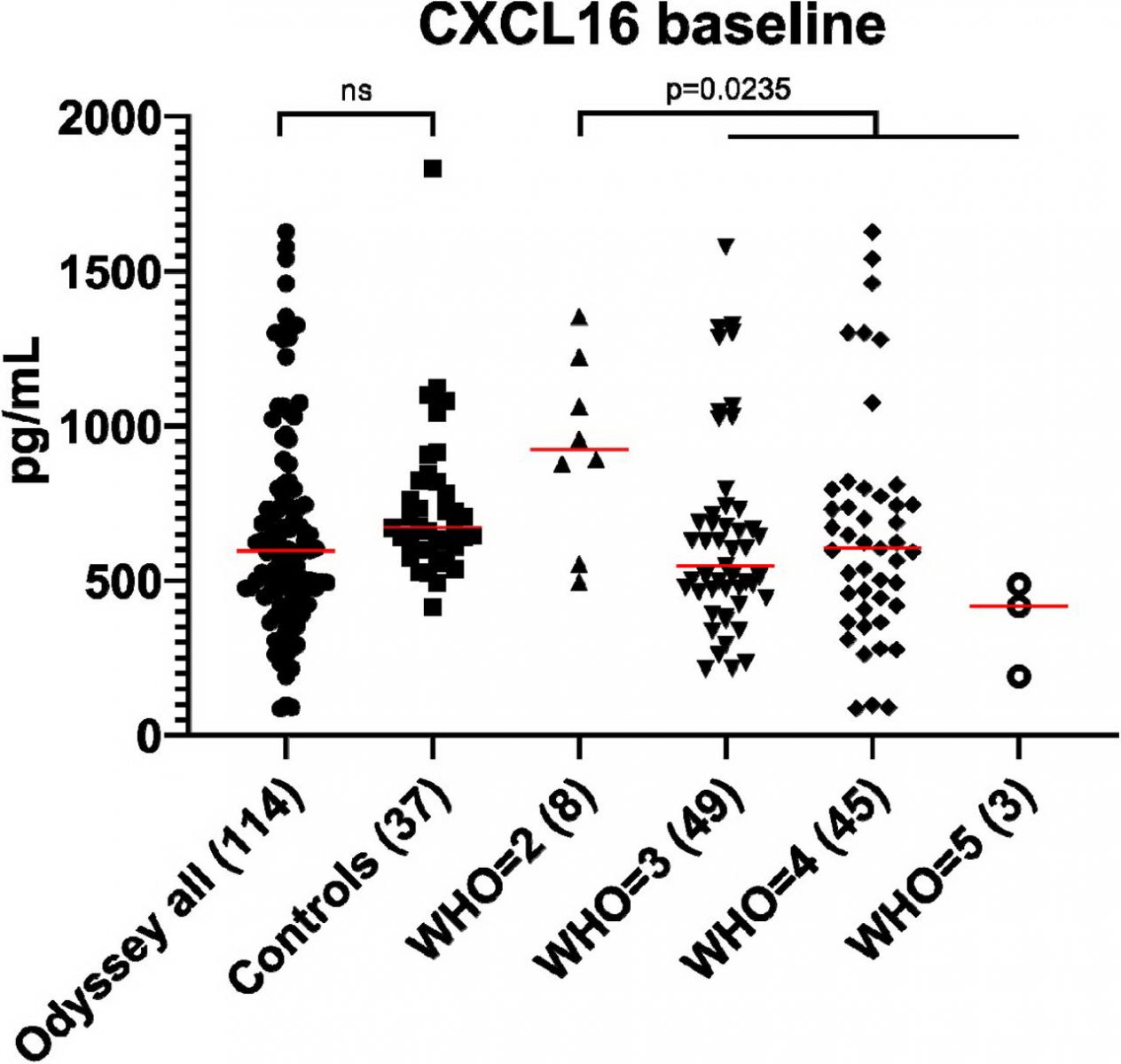BREAKING! Study Identifies Chemokines Receptor and Chemokines CXCR6/CXCL16 As Key Players In Immuno-Pathogenesis Of Severe COVID-19
Source: COVID-19 Research Sep 17, 2021 3 years, 7 months, 1 week, 2 days, 13 hours, 1 minute ago
COVID-19 Research: A new private study by researchers from Vanda Pharmaceuticals Inc, a global biopharmaceutical
company focused on the development and commercialization of innovative therapies located in Washington DC-USA has uncovered that the chemokine receptor and the chemokine CXCR6/CXCL16 plays a key role in the in the immuno-pathogenesis of severe COVID-19.

The study findings were published on a preprint server and are currently being peer reviewed.
https://www.medrxiv.org/content/10.1101/2021.09.07.21263222v1.full#ref-2
Recent genome-wide association studies have identified that the 3p21.31 region of the human host chromosome, encompassing the
CXCR6 gene, as the strongest thus far reported susceptibility region associated with a severe manifestation of COVID-19 (rs73064425, OR=2.14,
P-value=4.77E-30)1.
Also another lead severity variant rs10490770:T>C pointing to
CXCR6 was also reported with a
P-value of 1.443E-73 (hospitalization) and 2.20E-61 (critical illness) by the COVID-19 Host Genetics Initiative.
https://pubmed.ncbi.nlm.nih.gov/34237774/
Another study also reported that risk allele (rs10490770) carriers experienced an increased risk of COVID-19 related mortality (HR 1.5, 95% CI 1.3-1.8)3. Risk allele carriers had increased odds of several COVID-19 complications: severe respiratory failure (OR 2.0, 95% CI 1.6-2.6), venous thromboembolism (OR 1.7, 95% CI 1.2-2.4)
https://www.medrxiv.org/content/10.1101/2021.03.07.21252875v1
The chemokine (C□X□C motif) ligand 16 (CXCL16) is synthesized as a transmembrane molecule that is expressed as a cell surface-bound molecule, and as a soluble chemokine. CXCL16 interacts with CXCR6 in leukocytes and other cells promoting chemotaxis or cell adhesion. It has been shown that inflammatory cytokines such as IFNγ and TNFα promote CXCL16 expression.
Importantly the chemokine CXCL16 has been previously implicated in the pathogenesis of lung injury upon which it is released and functions as a chemoattractant for CXCR6+ T, natural killer (NK), B, and dendritic cells.
https://onlinelibrary.wiley.com/doi/full/10.1111/jcmm.14419
It was found that CXCL16 levels were elevated in the serum of acute lung injury patients in comparison to controls. CXCR6 is expressed on T cells not only in T helper type 1 (Th1) inflammation but also in Th2 inflammation, where it is increased after allergen challenge.
Another past study has also shown that reduction in CD8+ T-lymphocytes occurred between C57BL/6 and CXCR6KO mice.
https://www.frontiersin.org/articles/10.3389/fimmu.2019.00339/full
It is also known that CXCR6 is a major co-receptor of HIV type 2 variants.
128/JVI.79.3.1686-1700.2005">https://journals.asm.org/doi/full/10.1128/JVI.79.3.1686-1700.2005
It is also known that the CXCR6/CXCL16 axis mediates homing of T cells to the lungs in disease and when hyper expressed is associated with localized cellular injury. This CXCR6/CXCL16 axis is involved in lung pathology also associated with other infections, including influenza. Antagonism was reported to result in reduced inflammation.
It has also been shown that the knockdown ofCXCR6 reversed the effect of CXCL16 and so did the treatment with the p38 inhibitor SB203580 abolished the effects of CXCL166.
Interestingly another study has shown that the absence of CXCR6 significantly decreases airway CD8 resident memory T cells due to altered trafficking of CXCR6−/− cells within the lung. Moreover mice lacking CXCL16 also had decreased CD8 resident memory T cells in the airways and ultimately blocking CXCL16 resulted in the inhibition of the steady-state maintenance of airway resident memory T cells.
https://rupress.org/jem/article/216/12/2748/132521/CXCR6-regulates-localization-of-tissue-resident
Numerous researchers are working to contain the COVID-19 pandemic, caused by the rapid outbreak of the SARS-CoV-2 virus and emerging variants.
Most now finally believe that understanding various aspects of the virus at its genomic and molecular level along with an understanding of human host genetic factors is extremely important for developing effective COVID-19 vaccines and therapeutics. A better comprehension of SARS-CoV-2 transmission dynamics would help healthcare policymakers formulate effective strategies to restrict the further spread of the virus and contain the pandemic.
The current research team studying the SARS-CoV-2 genome has identified a region on the human host chromosome linked with the disease severity.
The team had identified a region (3p21.31) surrounding the CXCR6 gene as a region associated with the severe manifestation of COVID-19 infection.
Some past researchers had reported increased levels of CD8+CXCR6+ T cells in older age groups but that these cells were found to be absent in patients who were severely infected with SARS-CoV-2.
However another
COVID-19 Research study, conducted on a small sample, revealed that levels of CXCL16 in plasma were significantly upregulated in severely infected patients compared to patients with mild COVID-19 symptoms.
https://www.biorxiv.org/content/10.1101/2021.01.25.428125v1.abstract
https://www.nature.com/articles/s41586-020-03065-y
More importantly a recent study conducted by the COVID-19 Host Genetics Initiative also showed that the CXCR6 gene was closely associated with disease severity.
https://pubmed.ncbi.nlm.nih.gov/33915569/
That study linked the expression of the CXCR6 gene with hospitalization and critical illness due to SARS-CoV-2 infection. The research team reported that risk allele carriers displayed an elevated possibility of COVID-19 related mortality. These risk allele carriers enhanced the odds of complications associated with COVID-19 infection, such as venous thromboembolism and respiratory failure.
The chemokine (CXC motif) ligand 16, also known as CXCL16, is produced as a transmembrane molecule and expressed as a cell surface-bound molecule. CXCL16 is a type of soluble chemokine.
In this current research by Vanda Pharmaceuticals Inc, the study team measured CXCL16 in the plasma of COVID-19 hospitalized patients.
https://www.vandapharma.com/
 Baseline plasma CXCL16 levels in association with severity of COVID-19 manifestation and case control analysis. Severe (as defined by WHO scale) cases had significantly higher levels of CXCL16 – effect that is statistically significant.
Baseline plasma CXCL16 levels in association with severity of COVID-19 manifestation and case control analysis. Severe (as defined by WHO scale) cases had significantly higher levels of CXCL16 – effect that is statistically significant.
The study team characterized the CXCR6/CXCL16 axis in the pathogenesis of severe COVID-19 disease.
The team collected data on the concentration of CXCL16 in plasma, at the baseline, from 115 patients hospitalized due to severe COVID-19 infection.
These SARS-CoV-2 infected patients were enrolled in the ODYSSEY COVID-19 clinical trial. The participants’ plasma concentrations were compared with the plasma of healthy individuals (control group).
Importantly this analysis revealed an elevated level of CXCL16 in the serum of the patients suffering severe lung injury, i.e., hospitalized patients, compared to healthy individuals in the control group.
The study team also revealed a decrease in CD8+ T-lymphocytes between C57BL/6 and CXCR6KO in mice.
The study team recommended an orally bioavailable compound, an antagonist of the CXCR6 receptor, which brought about a reduction in growth in a mouse xenograft model of hepatocellular carcinoma.
Thailand Medical News would like to add that past phytochemical research in the field of oncology have showed that the phytochemicals Aescin and Shikonin have the ability to act as antagonist of the CXCR6 receptor. These compounds can be found in our therapeutic teas for COVID-19.
https://www.thailandmedical.news/news/new-therapeutic-teas-
More detailed studies on the antagonism of the CXCR6/CXCL16 axis are required to understand the timing of the treatment to ensure the best outcome.
These study findings are important because it included the largest cohort studied thus far to determine the role of the CXCR6/CXCL16 axis in the immunopathogenesis of severe COVID-19 and can help in developing treatment protocols.
For the latest
COVID-19 Research findings, keep on logging to Thailand Medical News.

 Baseline plasma CXCL16 levels in association with severity of COVID-19 manifestation and case control analysis. Severe (as defined by WHO scale) cases had significantly higher levels of CXCL16 – effect that is statistically significant.
Baseline plasma CXCL16 levels in association with severity of COVID-19 manifestation and case control analysis. Severe (as defined by WHO scale) cases had significantly higher levels of CXCL16 – effect that is statistically significant.